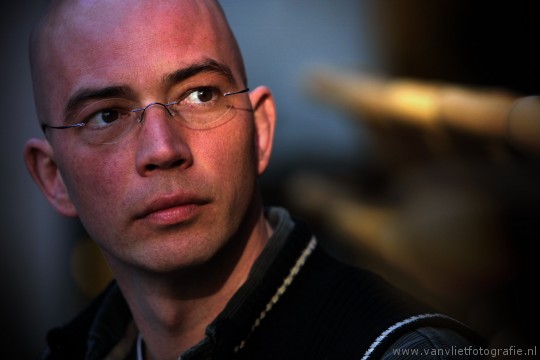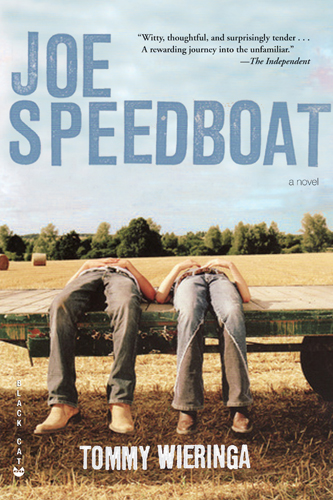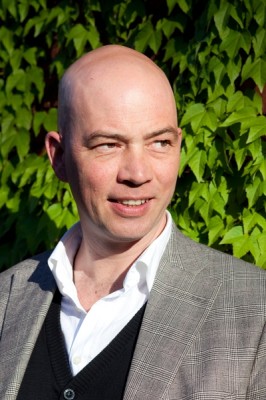An Interview with Novelist Tommy Wieringa: Revisited
by Sampsonia Way and Silvia Duarte / May 1, 2014 / No comments
“If your mind is the size of the cage, you come back to the cage.”
This year, Dutch novelist Tommy Wieringa had the honor of penning Dutch Book Week’s Boekenweekgeschenk, a novella given away by bookstores and libraries over the course of the festivities. His novella, A Beautiful Young Woman has been praised as “the best gift book since 1984, when literary novellas were reinstated.” In addition, Wieringa was recently ranked the most important Dutch author of 2013 by Editio creative writing academy. With respect to these achievements, Sampsonia Way presents our interview with Wieringa from 2010, when he came to Pittsburgh to read from his newly translated novel Joe Speedboat.
__________________________________________________________________________________________
On April 27, novelist Tommy Wieringa visited Sampsonia Way to give a reading with Sofi Oksanen and Christos Tsoilkas. The event was sponsored by City of Aslyum/Pittsburgh in partnership with PEN/America. While he was here, he sat down for a chat with Sampsonia Way editor Silvia Duarte.
In this interview, he profiles himself, telling stories and anecdotes about his childhood as well as describing his writing process. He laughs easily—especially when the comments are ironic and sharp―and talks about his affection for his characters, who can be universal, although they are stuck in a small village in the Netherlands.
Wieringa’s 2005 novel Joe Speedboat has been translated into ten languages, most recently English. The book was a best seller in Holland. He is also the author of two other novels and a recipient of the F. Bordewijk Prize.
READ an excerpt from Joe Speedboat.
This novel describes many characters which are, in one way or another, trapped in a small village. Why was this topic relevant for you?
I played Rugby in a small village for almost 20 years, and there were players who had big dreams. There was one big man ―almost two meters tall― and a very strong player with the mind of a poet; his dream was to explore the world. After years and years of considering it, he sold his house in the little village and went for his world trip. First, he went to the north of Europe, and he met a woman in Sweden and stayed there. After two years, they broke up and he went back to the village and got a job as a road worker.
So in the end, he couldn’t get out, he couldn’t stretch his wings, and he came back to his cage.
And this story struck me in a very sad and beautiful way. With him, I saw how that works, and in many ways the characters Joe Speedboat and Frankie Hermans are like him.
And Regina Ratzinger―another character― is like the rugby player too. Despite the fact of traveling around the world, she came back to the village, where she remained remembering her “exotic” experiences in a pathetic way.
If your mind is the size of the cage, you come back to the cage. Regina is a particular character; she is a post-hippie. I know a lot of woman like her—they dye their hair with henna, they are interested in astrology, and suddenly they decide that not only they are going to be vegetarian, but their whole family is going to be vegetarian too. Regina has a lot of knowledge and intelligence but she doesn’t know where to use it, because she came back to the village and has spent most of her time in the house.
All these trapped characters are reflected in the last sentence of your book: “We are still here.” How did you end up writing this sentence?
It is the loneliest sentence of the whole book. When I was writing the novel, I knew what the last sentence had to be. I knew that everything that lead to that sentence was right, that everything that diverged from that sentence had to go away.
For that reason was quite easy to write the book; that sentence was my goal. It encloses all the melancholia, all the sadness of the characters.
Is Lomark ―the fictional town in which the book is set― a mixture of the cities where you grew up?
Yes, I grew up in these farm villages—very Catholic—slowly transitioning to industry, and I made use of them. When I was writing the book, I thought back and I saw how these villages looked, how they smelled, and how people lived there. I am unable to write about cities because there are so many things in them to write about. I like to write about small villages, where small things have a big meaning.
Why and when did you start to write?
I felt powerless as an adolescent; I was not able to understand anything that was happening to me. Through writing, I was recreating scenarios and through them I gained a little understanding of love, sex, and my place in the world. I grew up with my father in a very, very large farm house, it was two hours away from school, so I had four hours each day to think about what was happening to me and I wrote like a maniac.
I also understood that language is power and writing is energy in a different form. Things that seem meaningless in life take on light and meaning when you write about them well. And I actually realized that making good use of sentences and trying to control language made me lucky with girls. When I really liked a girl and I was too shy to tell her, I wrote her a letter ―of course a very bombastic letter― but still mine were better than any of my classmates.
You were expelled from school when you were 17; rebelliousness seems to be part of your personality. Your main characters are rebels too. Frankie is a rebel from his wheel chair through observation and writing, and Joe is a rebel through the action of making an airplane. Which of these characters reflects you more?
I think both of them illustrate me in a way. But some characteristics of Joe Speedboat—a guy who likes action—are so far away from me; I never drove a motorcycle, for instance. Actually I grew up more as a girl until I started to play rugby; I had my secret world in diaries and poetry. But on the other hand I was against teachers, against police, etc. I had this problem with authority that caused me a lot of trouble.
But, again, being a girl is really close to me. When I was 15 or 16, I looked like a girl, I had long hair and a pretty face that could be boyish or girlish. I was even whistled at by construction workers. When I started becoming more masculine, I got rid of the diaries and I began to write prose.
Frankie Hermans is an uncommon paraplegic; he writes in his diaries about everything that happens in the village, and he is the narrator of the book despite the fact he can’t talk. Was it a complex process for you, as a writer, to create that voice and make it believable?
For me that voice was believable since the beginning, because there are cases like Frankie’s in the world. Imagine the voice of Stephen Hawking who is not able to speak, but is one of the greatest minds on earth; he communicates and we actually imagine his strong voice. It’s amazing that someone who is in a wheel chair, unable to move, explains the cosmos.
To write through this character was easy because I just had to remember how it was to be young. But on the other hand, I had a technical problem to make him sound good. How can I make clear what he wants if I couldn’t use dialogue. However, I felt so close of this voice ―and so comfortable writing it― that after I finished Joe Speedboat and started writing a new book, his voice came back to me; I had to wait for a year until this voice evaporated and I could find a new one.
Other of your characters, Arthur Metz ―a novelist― says that every book written without a personal vendetta is a failure. What do you think about this statement?
I think he is very right about that; there is not great literature without a personal vendetta. This book is a vendetta for me, and it’s very funny that no one in Holland asked about this character or his statement.
Could you describe the process behind your research and its importance?
I read in a newspaper that E. L. Doctorow said that there is not a real need for research; he said that what you should do is use your imagination. Well, I disagree, I like to go with people and ask them many, many questions. The funny thing about research is that it always gives you a little more than you expected.
Also I like to research because it’s nice to leave your desk, go out, and interview the former world champion of arm wrestling or Joost Conjin, who built his own airplane. I love to give my books a strong factual foundation; facts have to be right and strong. Joe Speedboat went to the Dakar Rally in a bulldozer, but before I wrote that part I wanted to be sure that a bulldozer could run at 120 kilometres per hour. I consulted a technician and he gave me more than I asked. He told me, “Well, to make a bulldozer run 120 kilometres per hour, you should adjust this and that, and also that.”
Your book has sold over 300,000 copies. Did you expect such great success of your book?
I was afraid that people couldn’t relate with the book. I was afraid that people saw it as a boys’ adventure book. I know you don’t have to think about readers when you are writing, but sometimes, when you have a bad day or when you are drunk, you do. As you know, most readers are women between their forties and sixties and I thought: how would they possible relate to this boyish view. But readers bought the book and that still surprises and pleases me a lot.
Click here to read Silvia’s bio.







